Report: Impact of Policy Principles on Happy Homes Organization
VerifiedAdded on 2020/06/05
|5
|989
|80
Report
AI Summary
This report examines the impact of various policy principles and legislations on the operations of Happy Homes, an organization providing homes for those in need. It outlines several key legislations, including the Data Protection Act 1998, Equal Pay Act 1975, and the Health and Safety at Work Act 1978, among others. The report then delves into two specific legislations: the Human Rights Act 1998, emphasizing the importance of equal treatment and protection against discrimination, and the Equality Act 2010, highlighting its nine legislations that prohibit discrimination based on various factors, ensuring equal opportunities for all employees and residents. The analysis underscores the necessity for Happy Homes to adhere to these laws to maintain its reputation and ensure a safe and secure environment for its employees and residents. The report includes references to support the findings.
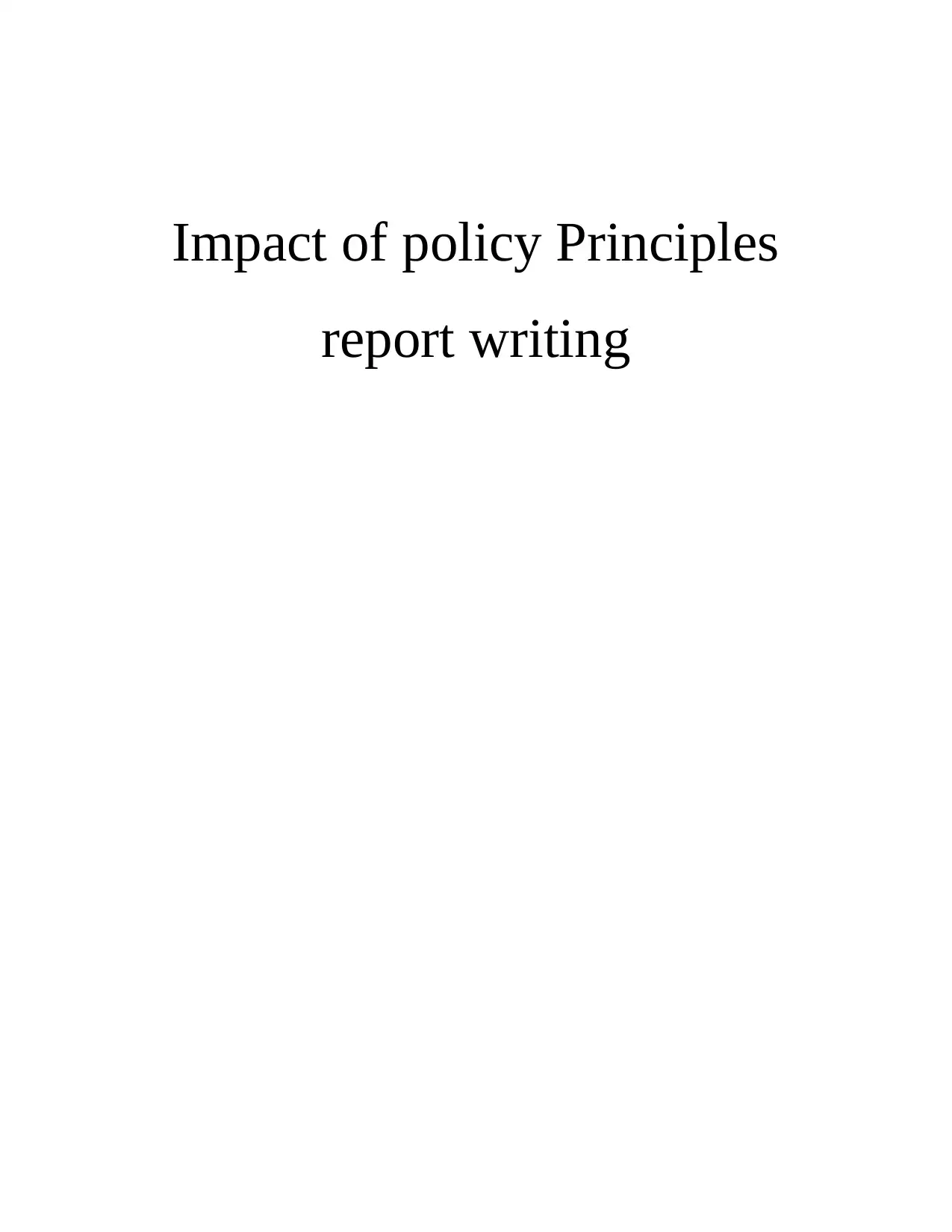
Impact of policy Principles
report writing
report writing
Paraphrase This Document
Need a fresh take? Get an instant paraphrase of this document with our AI Paraphraser
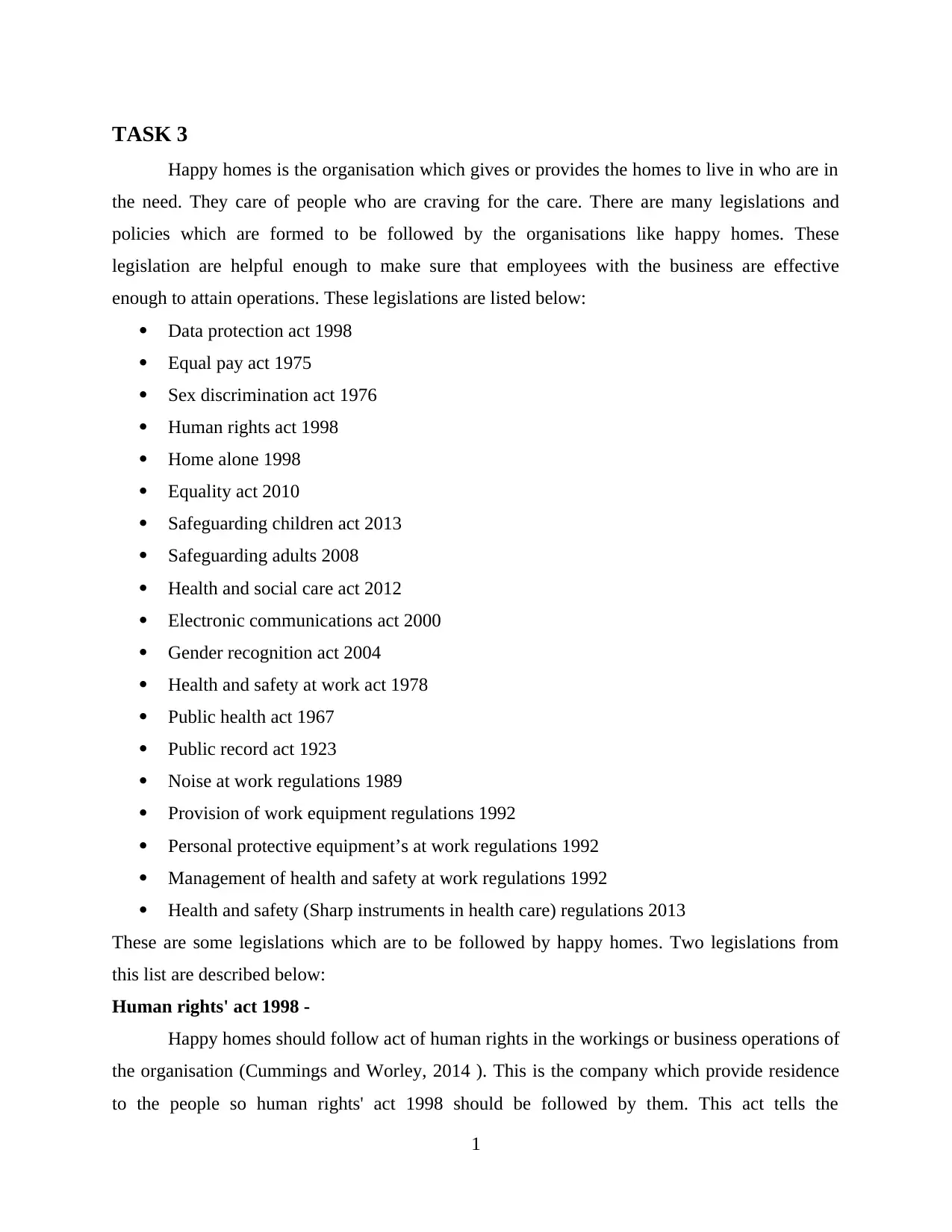
TASK 3
Happy homes is the organisation which gives or provides the homes to live in who are in
the need. They care of people who are craving for the care. There are many legislations and
policies which are formed to be followed by the organisations like happy homes. These
legislation are helpful enough to make sure that employees with the business are effective
enough to attain operations. These legislations are listed below:
Data protection act 1998
Equal pay act 1975
Sex discrimination act 1976
Human rights act 1998
Home alone 1998
Equality act 2010
Safeguarding children act 2013
Safeguarding adults 2008
Health and social care act 2012
Electronic communications act 2000
Gender recognition act 2004
Health and safety at work act 1978
Public health act 1967
Public record act 1923
Noise at work regulations 1989
Provision of work equipment regulations 1992
Personal protective equipment’s at work regulations 1992
Management of health and safety at work regulations 1992
Health and safety (Sharp instruments in health care) regulations 2013
These are some legislations which are to be followed by happy homes. Two legislations from
this list are described below:
Human rights' act 1998 -
Happy homes should follow act of human rights in the workings or business operations of
the organisation (Cummings and Worley, 2014 ). This is the company which provide residence
to the people so human rights' act 1998 should be followed by them. This act tells the
1
Happy homes is the organisation which gives or provides the homes to live in who are in
the need. They care of people who are craving for the care. There are many legislations and
policies which are formed to be followed by the organisations like happy homes. These
legislation are helpful enough to make sure that employees with the business are effective
enough to attain operations. These legislations are listed below:
Data protection act 1998
Equal pay act 1975
Sex discrimination act 1976
Human rights act 1998
Home alone 1998
Equality act 2010
Safeguarding children act 2013
Safeguarding adults 2008
Health and social care act 2012
Electronic communications act 2000
Gender recognition act 2004
Health and safety at work act 1978
Public health act 1967
Public record act 1923
Noise at work regulations 1989
Provision of work equipment regulations 1992
Personal protective equipment’s at work regulations 1992
Management of health and safety at work regulations 1992
Health and safety (Sharp instruments in health care) regulations 2013
These are some legislations which are to be followed by happy homes. Two legislations from
this list are described below:
Human rights' act 1998 -
Happy homes should follow act of human rights in the workings or business operations of
the organisation (Cummings and Worley, 2014 ). This is the company which provide residence
to the people so human rights' act 1998 should be followed by them. This act tells the
1
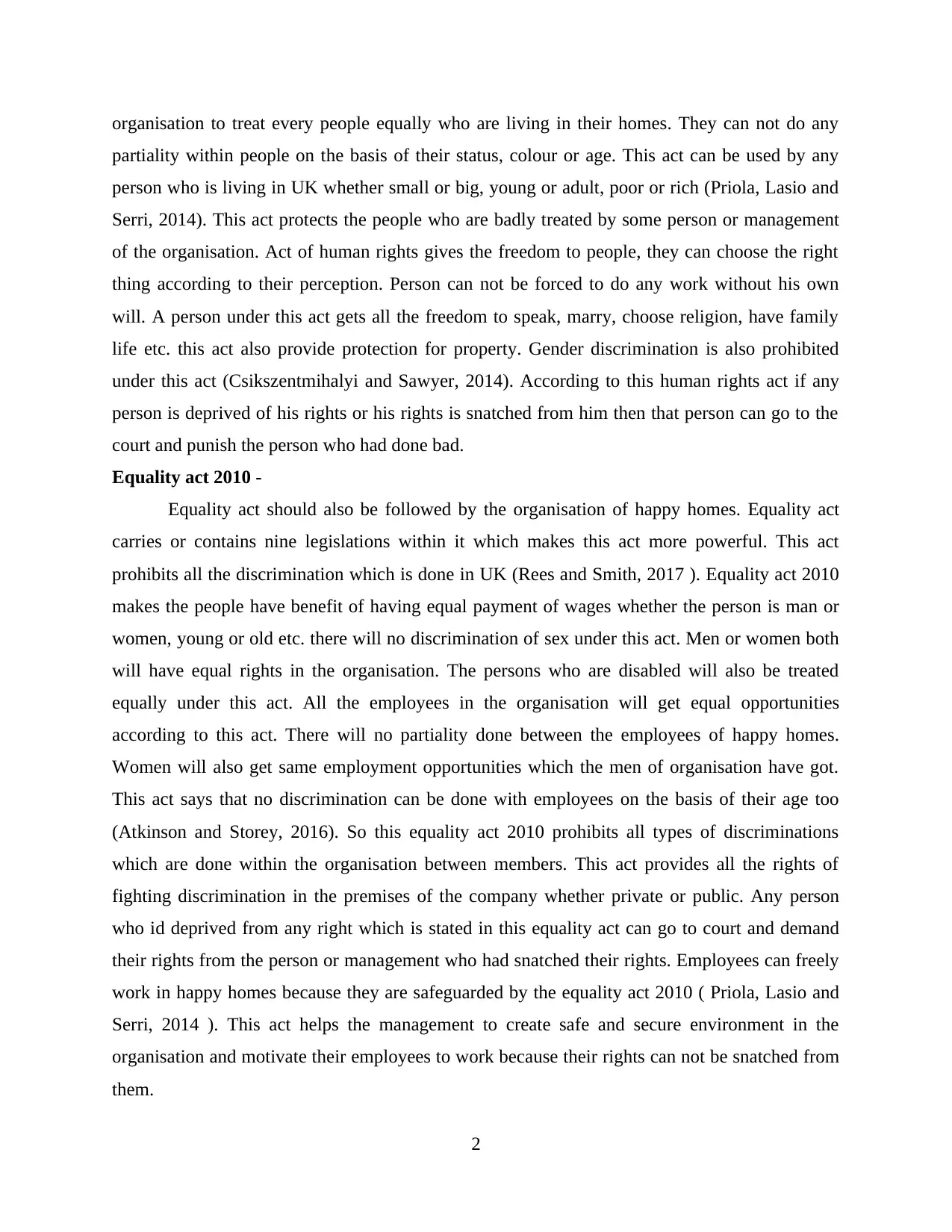
organisation to treat every people equally who are living in their homes. They can not do any
partiality within people on the basis of their status, colour or age. This act can be used by any
person who is living in UK whether small or big, young or adult, poor or rich (Priola, Lasio and
Serri, 2014). This act protects the people who are badly treated by some person or management
of the organisation. Act of human rights gives the freedom to people, they can choose the right
thing according to their perception. Person can not be forced to do any work without his own
will. A person under this act gets all the freedom to speak, marry, choose religion, have family
life etc. this act also provide protection for property. Gender discrimination is also prohibited
under this act (Csikszentmihalyi and Sawyer, 2014). According to this human rights act if any
person is deprived of his rights or his rights is snatched from him then that person can go to the
court and punish the person who had done bad.
Equality act 2010 -
Equality act should also be followed by the organisation of happy homes. Equality act
carries or contains nine legislations within it which makes this act more powerful. This act
prohibits all the discrimination which is done in UK (Rees and Smith, 2017 ). Equality act 2010
makes the people have benefit of having equal payment of wages whether the person is man or
women, young or old etc. there will no discrimination of sex under this act. Men or women both
will have equal rights in the organisation. The persons who are disabled will also be treated
equally under this act. All the employees in the organisation will get equal opportunities
according to this act. There will no partiality done between the employees of happy homes.
Women will also get same employment opportunities which the men of organisation have got.
This act says that no discrimination can be done with employees on the basis of their age too
(Atkinson and Storey, 2016). So this equality act 2010 prohibits all types of discriminations
which are done within the organisation between members. This act provides all the rights of
fighting discrimination in the premises of the company whether private or public. Any person
who id deprived from any right which is stated in this equality act can go to court and demand
their rights from the person or management who had snatched their rights. Employees can freely
work in happy homes because they are safeguarded by the equality act 2010 ( Priola, Lasio and
Serri, 2014 ). This act helps the management to create safe and secure environment in the
organisation and motivate their employees to work because their rights can not be snatched from
them.
2
partiality within people on the basis of their status, colour or age. This act can be used by any
person who is living in UK whether small or big, young or adult, poor or rich (Priola, Lasio and
Serri, 2014). This act protects the people who are badly treated by some person or management
of the organisation. Act of human rights gives the freedom to people, they can choose the right
thing according to their perception. Person can not be forced to do any work without his own
will. A person under this act gets all the freedom to speak, marry, choose religion, have family
life etc. this act also provide protection for property. Gender discrimination is also prohibited
under this act (Csikszentmihalyi and Sawyer, 2014). According to this human rights act if any
person is deprived of his rights or his rights is snatched from him then that person can go to the
court and punish the person who had done bad.
Equality act 2010 -
Equality act should also be followed by the organisation of happy homes. Equality act
carries or contains nine legislations within it which makes this act more powerful. This act
prohibits all the discrimination which is done in UK (Rees and Smith, 2017 ). Equality act 2010
makes the people have benefit of having equal payment of wages whether the person is man or
women, young or old etc. there will no discrimination of sex under this act. Men or women both
will have equal rights in the organisation. The persons who are disabled will also be treated
equally under this act. All the employees in the organisation will get equal opportunities
according to this act. There will no partiality done between the employees of happy homes.
Women will also get same employment opportunities which the men of organisation have got.
This act says that no discrimination can be done with employees on the basis of their age too
(Atkinson and Storey, 2016). So this equality act 2010 prohibits all types of discriminations
which are done within the organisation between members. This act provides all the rights of
fighting discrimination in the premises of the company whether private or public. Any person
who id deprived from any right which is stated in this equality act can go to court and demand
their rights from the person or management who had snatched their rights. Employees can freely
work in happy homes because they are safeguarded by the equality act 2010 ( Priola, Lasio and
Serri, 2014 ). This act helps the management to create safe and secure environment in the
organisation and motivate their employees to work because their rights can not be snatched from
them.
2
⊘ This is a preview!⊘
Do you want full access?
Subscribe today to unlock all pages.

Trusted by 1+ million students worldwide
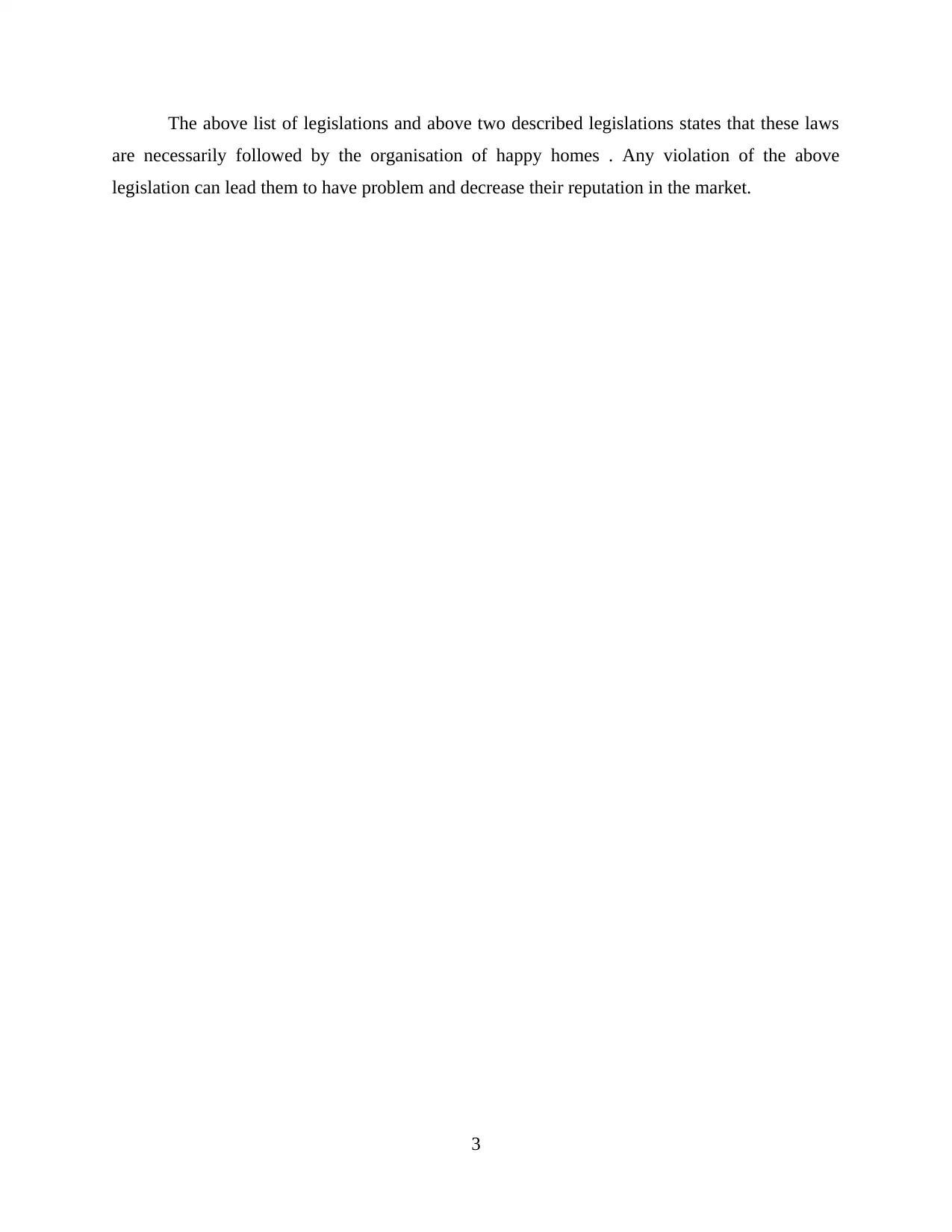
The above list of legislations and above two described legislations states that these laws
are necessarily followed by the organisation of happy homes . Any violation of the above
legislation can lead them to have problem and decrease their reputation in the market.
3
are necessarily followed by the organisation of happy homes . Any violation of the above
legislation can lead them to have problem and decrease their reputation in the market.
3
Paraphrase This Document
Need a fresh take? Get an instant paraphrase of this document with our AI Paraphraser
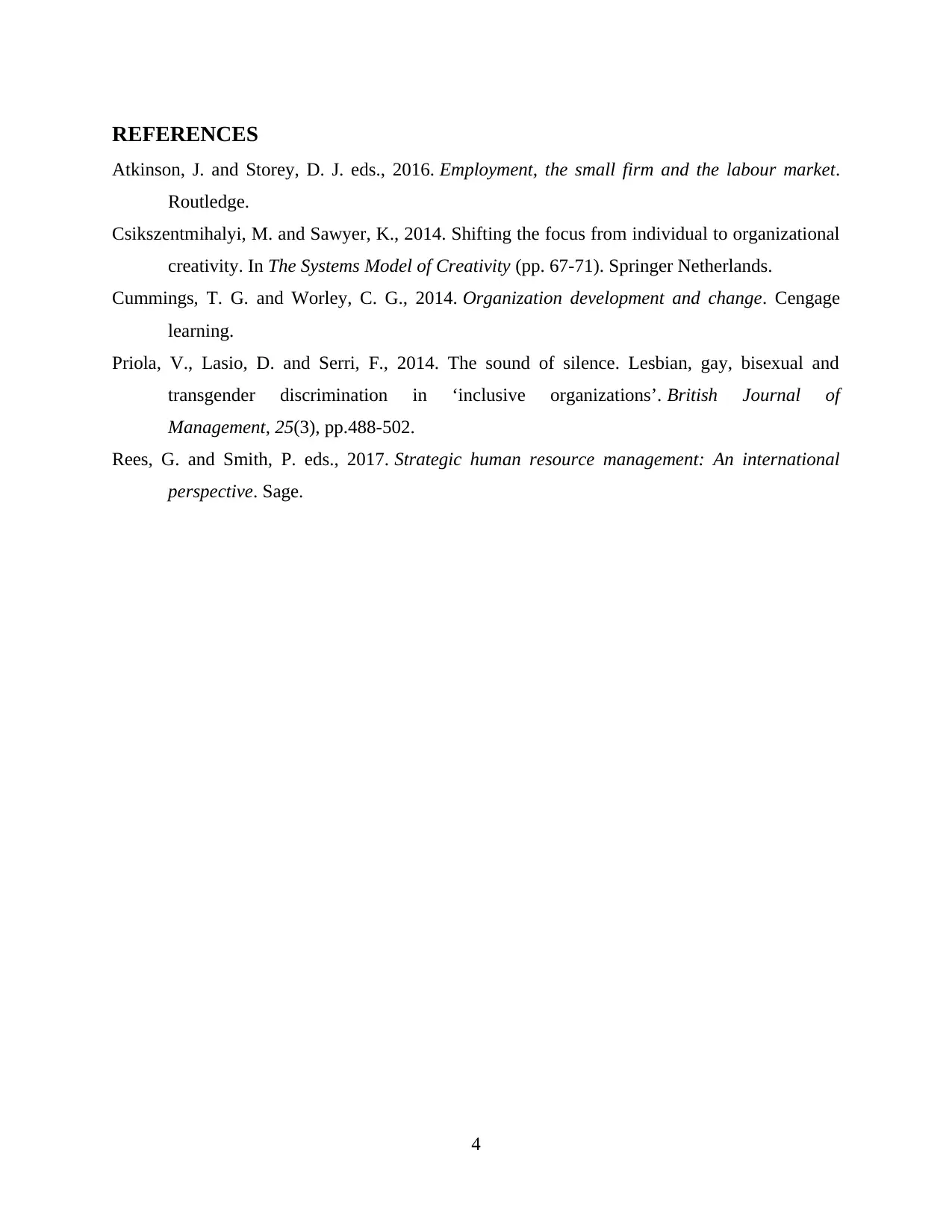
REFERENCES
Atkinson, J. and Storey, D. J. eds., 2016. Employment, the small firm and the labour market.
Routledge.
Csikszentmihalyi, M. and Sawyer, K., 2014. Shifting the focus from individual to organizational
creativity. In The Systems Model of Creativity (pp. 67-71). Springer Netherlands.
Cummings, T. G. and Worley, C. G., 2014. Organization development and change. Cengage
learning.
Priola, V., Lasio, D. and Serri, F., 2014. The sound of silence. Lesbian, gay, bisexual and
transgender discrimination in ‘inclusive organizations’. British Journal of
Management, 25(3), pp.488-502.
Rees, G. and Smith, P. eds., 2017. Strategic human resource management: An international
perspective. Sage.
4
Atkinson, J. and Storey, D. J. eds., 2016. Employment, the small firm and the labour market.
Routledge.
Csikszentmihalyi, M. and Sawyer, K., 2014. Shifting the focus from individual to organizational
creativity. In The Systems Model of Creativity (pp. 67-71). Springer Netherlands.
Cummings, T. G. and Worley, C. G., 2014. Organization development and change. Cengage
learning.
Priola, V., Lasio, D. and Serri, F., 2014. The sound of silence. Lesbian, gay, bisexual and
transgender discrimination in ‘inclusive organizations’. British Journal of
Management, 25(3), pp.488-502.
Rees, G. and Smith, P. eds., 2017. Strategic human resource management: An international
perspective. Sage.
4
1 out of 5
Related Documents
Your All-in-One AI-Powered Toolkit for Academic Success.
+13062052269
info@desklib.com
Available 24*7 on WhatsApp / Email
![[object Object]](/_next/static/media/star-bottom.7253800d.svg)
Unlock your academic potential
Copyright © 2020–2026 A2Z Services. All Rights Reserved. Developed and managed by ZUCOL.




